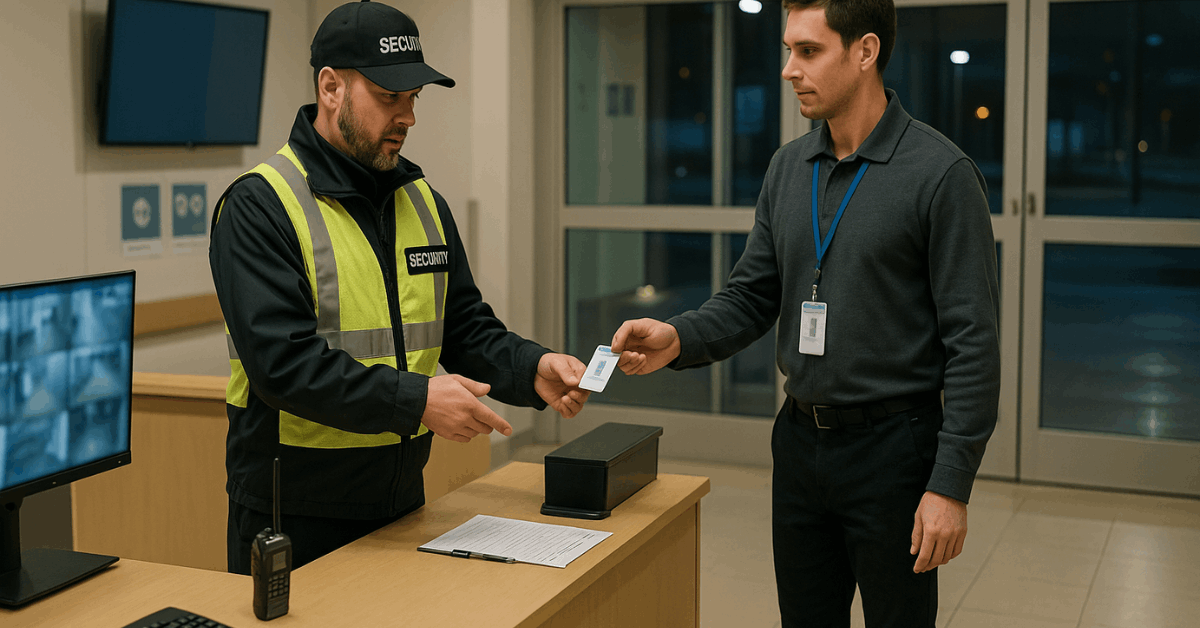Demand for Night Shift Security Jobs stays steady as facilities protect assets, staff, and visitors outside regular hours.
Strong candidates combine licensing, incident readiness, and reliable routines for overnight work. Setting a clear target role, validating credentials, and applying through high-signal channels speeds interviews and avoids stalled applications.

What Night Shift Security Jobs Involve
Roles focus on patrols, access control, alarm response, CCTV monitoring, incident reporting, and coordination with managers or emergency services.
Alternate labels include third shift, graveyard shift, midnight shift, or closing shift, with hours commonly starting around 10:00 p.m.–12:00 a.m. and ending 6:00–8:00 a.m., though schedules vary by site.
Employers prioritize vigilance, accurate logs, and calm escalation when policies or safety are at stake.
Required Certifications and Licenses
Licensing rules vary by country or state/province; many jurisdictions require a security guard license plus a background check before working front line.
The U.S. Occupational Outlook Handbook notes state-specific licensing for security guards; the U.K. uses SIA licensing with identity, right-to-work, training, and criminal record checks.
Always confirm renewal cycles and any sector add-ons, such as healthcare or data center clearances.
Your Medical Readiness
Medical readiness matters on nights. CPR and First Aid credentials from recognized providers (e.g., American Red Cross) strengthen candidacy and satisfy many workplace requirements.
Candidates targeting advanced roles can add the Certified Protection Officer (CPO) credential from IFPO, which covers risk assessment, security tech, and incident management.
Permit Rules
Applicants seeking armed posts must follow firearms-permit rules in their jurisdiction and maintain proficiency through mandated refreshers where applicable.
When requirements are unclear, verify directly with the regulator listed on the employer’s posting or the national licensing authority site.
Where to Search and Apply
A focused channel mix raises response rates and keeps time-to-offer short.
- ZipRecruiter: AI-assisted matching highlights high-fit roles and powers quick screening events (ZipIntro). Set alerts for night shift security guard, graveyard shift security, or CCTV monitoring jobs.
- Official employer portals: Hospitals, logistics hubs, hotels, data centers, and universities post overnight vacancies first on careers sites.
- Professional associations: IFPO chapters and regional security associations share member boards, events, and certification guidance.
- Referrals: Current guards and supervisors often know openings before public posting; a short, updated résumé plus licenses accelerates referral submittals.
- Community and local boards: Mall management, property managers, and industrial parks may advertise warehouse security guard night coverage needs.
Build a Competitive Profile
Highlight mastery of security tech:
- modern VMS/CCTV suites,
- access control (cards/biometrics),
- alarm platforms,
- incident-reporting software,
- radios, and
- mobile patrol apps.
Emphasize soft skills that drive outcomes at 2 a.m.: clear communication, accurate written reports, situational awareness, and policy adherence.
Tailor bullet points to target environments, hotel security jobs overnight, corporate campuses, or healthcare, so recruiters can map experience to risk profiles quickly.
Resume sections should surface licensing ID numbers (where appropriate), CPR/First Aid dates, recent scenario drills, and equipment you’ve used in live incidents. Keep accomplishments measurable (response times, patrol coverage, reduction in false alarms, audit pass rates).
Screenings and Background Checks to Expect
Expect employment verification, criminal record checks aligned to local regulations, and identity/right-to-work validation.
U.K. SIA licensing requires training completion, ID, and criminal checks; many U.S. states require licensing plus background screening before assignment.
Driving record checks are common for patrol roles; drug testing may apply to critical-infrastructure sites. Prepare digital copies of licenses and certificates to shorten compliance cycles at offer stage.
Pay, Differentials, and Shifts
Compensation varies by market, industry, and credentials. The U.S. median annual wage for security guards was $38,370 (May 2024), with pay higher in demanding sectors and high-cost metros.
Many employers add a night shift differential, often structured as a percentage (commonly 5–15%) or a flat hourly premium for undesirable hours; policies differ by employer and bargaining status.
Federal guidance also recognizes night differentials for certain wage system employees. Validate posted rates and differentials in the offer letter.
Application Steps That Work
Strong execution moves applications to interviews quickly while avoiding common stalls such as missing documents or expired credentials.
- Define the target environment and title: Align to clear phrases recruiters use: armed security night shift, entry level security guard, or CCTV operator. Shortlists help customize achievements and training notes to the risks of each site.
- Assemble verifiable credentials: Gather license numbers, CPR/First Aid cards, right-to-work documentation, and regulator-required photos. Confirm expiry dates and continuing education status.
- Optimize the résumé for screening systems: Name the technologies you’ve actually used (VMS brand, access platform), patrol scope, incident types handled, and any compliance audits passed.
- Apply through multiple high-signal channels: Combine employer portals, association boards, referrals, and AI-matched boards like ZipRecruiter to boost interview volume.
- Prepare for scenario-based interviews: Practice concise responses for alarm response, trespass de-escalation, emergency coordination, and report-writing speed/accuracy using sample floor plans or camera grids.

Onboarding and Advancement
After an offer, effective onboarding includes site induction, policy reviews, equipment training, and supervised shifts to validate patrol routes and escalation procedures.
Candidates who proactively request drills for alarms, access denials, and medical incidents learn the site’s thresholds faster and earn trust earlier.
Career progression accelerates through role-relevant certifications such as CPO and supervisor training, plus cross-training on additional systems like visitor management or enterprise access control.
Staying Effective on Nights
Overnight work challenges sleep, alertness, and consistency. A short plan keeps performance steady and reports accurate.
- Protect daytime sleep: Aim for 7–9 hours in a dark, quiet room; use naps as needed to sustain alertness, per NIOSH and sleep-medicine guidance.
- Use light strategically: Bright light early in the shift supports alertness; reduce exposure late in the shift to ease post-shift sleep. Blue-enriched light increases alertness but can suppress melatonin and shift circadian timing.
- Hydrate and time caffeine: Steady water intake maintains alertness; avoid caffeine within five hours of planned sleep to reduce insomnia risk. NIOSH underscores fatigue risks from long hours and circadian disruption.
- Fuel for stamina: Favor balanced meals before shift and nutrient-dense snacks during patrols to prevent energy crashes that impair vigilance.
- Engage the mind during quiet windows: Rotate camera views, update logs promptly, run short what-if drills, or complete brief puzzles to deter drowsiness without leaving posts unattended.
Industry Fit and Role Variations
Medium sites may combine duties, access control, patrols, and monitoring, in a single post; large campuses often specialize roles across control rooms, lobbies, and zones.
Data centers, hospitals, and logistics hubs enforce tighter SOPs and audits; hotels emphasize guest service and discreet incident handling. Matching prior experience to these environments clarifies fit and salary expectations in early screens.
Common Mistakes to Avoid
Skipping license verification stalls offers during compliance checks. Overlooking shift differentials during negotiations reduces total compensation compared to day-shift peers.
Generic résumés that omit system names, patrol coverage, and incident metrics undercut credibility. Neglecting sleep and light management erodes vigilance and increases the risk of errors on patrol.
Conclusion
A proven approach to Night Shift Security Jobs blends verified licensing, targeted search channels, and measurable skills.
Keep credentials current, present incident-ready competencies clearly, and manage sleep and light deliberately to sustain performance.
Consistent execution across these steps leads to faster interviews, smoother onboarding, and stronger outcomes on the overnight watch.











